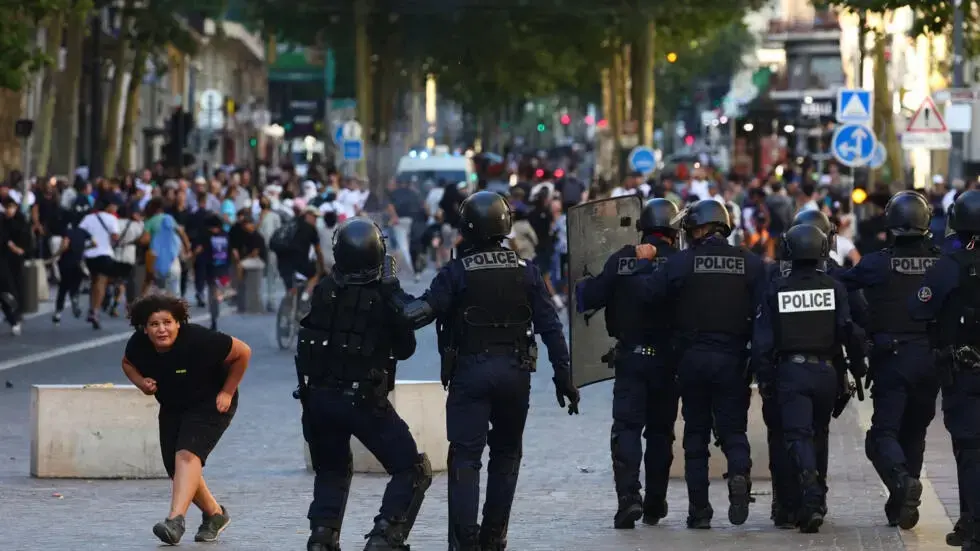French police probing death during Marseille riots
PARIS

Authorities on Wednesday probed the death of a man who may have been felled by a police rubber bullet during riots in Marseille, as France counts the cost of its most intense urban violence in nearly two decades.
Prosecutors in Marseille, a southern port wracked by some of the worst clashes, said a 27-year-old man riding a scooter had been found dead overnight Saturday to Sunday and was believed to have suffered a heart attack.
Prosecutor Dominique Laurens said he had opened an investigation into "a death involving the use of a weapon" that appeared to be consistent with a projectile known as a "flashball".
If confirmed, the death would be the first reported during the week-long riots, which were sparked by the fatal police shooting of a 17-year-old teenager of North African origin during a traffic stop in a Paris suburb on June 27.
In northeastern France, a family has filed a complaint accusing security forces of "intentional violence" on Friday that has left their 25-year-old son fighting for his life in hospital.
Security guard Aimene Bahouh was driving with his window open on the way to a petrol station after work when he "was hit by a projectile" in the head, a family member who asked not to be named told AFP.
The relative and the family lawyer said elite RAID police officers had fired projectiles known as "bean bags" after coming under a barrage of rocks from rioters.
France's IGPN police inspectorate at Metz is investigating the case.
The defence ministry said Wednesday that the navy was looking into claims that masked off-duty marines tackled rioters in the western city of Lorient, home to a major military base.
Local media published pictures of "anti-rioters" in hoods and masks beating up and apprehending suspected troublemakers in the city on Friday night.
The Ouest France newspaper published an interview with a 25-year-old who said he was a member of the armed forces and intervened along with 30 colleagues to support police so as to "not leave the country to burn".
Overnight on Tuesday-Wednesday, 45,000 security forces were again deployed nationwide, with the interior ministry reporting the second mostly calm evening in a row.
Only 16 arrests were made linked to public disorder nationwide -- compared with a peak of 1,300 in a single night Friday-Saturday.
Interior Minister Gerald Darmanin updated senators on the destruction by often teenage mobs in deprived, multi-ethnic areas of French cities where many complain of racism and discrimination.
Around 23,000 fires had been lit, 273 buildings belonging to the security forces had been damaged, along with 168 schools and 105 mayor's offices.
More than 3,500 people had been arrested, with their average age 17.
"We can see calm returning nationwide but remain very alert for the coming hours and days," Darmanin said.
A divisive political debate is now raging about the reasons for the mass targeting of police and other symbols of the French state.
Most opposition right-wing politicians have concluded the government has lost its grip in poor areas, dismissing suggestions that racism, poverty or police brutality could explain the anger.
Far-right parties have linked the most intense and widespread riots since 2005 to mass migration, calling for curbs on new arrivals.
Bruno Retailleau, who heads the opposition Republicans party in the Senate, sparked an outcry when he suggested rioters from immigrant backgrounds had undergone "a regression to their ethnic roots".
The comments from a mainstream conservative underscored the shrill debate about immigration and identity in France where far-right politicians such as Marine Le Pen are at historic highs in the polls.
Around 90 percent of those arrested during the riots were French nationals, interior ministry figures show.
The parliamentary head of the hard-left France Unbowed party, Mathilde Panot, denounced Retailleau's "crass racism".
Anti-Islam media commentator Eric Zemmour, who ran unsuccessfully for president last April, has likened the riots to an "ethnic war".
Darmanin, a right-winger in Macron's centrist cabinet, told senators that when he checked the names of detainees, "there were lots of Kevins too", referring to a name popular among the white working class.
Macron, who chaired a cabinet meeting on Wednesday, also sparked controversy by suggesting social media could be "cut off" in the future if "things get out of control", according to media reports.
He and his ministers have singled out platforms like Snapchat, TikTok and encrypted messenger Telegram for their role in helping organise and spread images of the violence.
The government wanted to bring together a cross-party group of lawmakers to discuss new legislation to regulate social networks, government spokesman Olivier Veran said on Wednesday.
He clarified that there would be no "blackouts", rather temporary blocks on particular functions of a site.
















